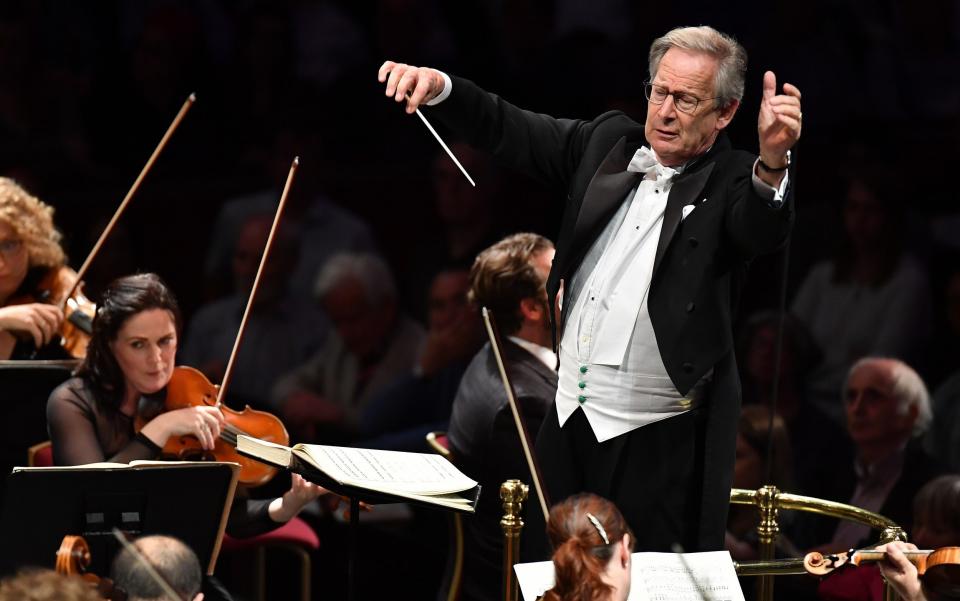Maestros and mayhem inside the febrile world of orchestras

- Oops!Something went wrong.Please try again later.
- Oops!Something went wrong.Please try again later.
- Oops!Something went wrong.Please try again later.
- Oops!Something went wrong.Please try again later.
To the outsider, the classical music world feels cloistered. It suggests a rarefied world of musicians playing in perfect harmony, and eliciting a strange sort of magic. And yet the idea that there may be trouble in paradise has been brought sharply into focus in the last week.
It was reported on Wednesday that the acclaimed conductor Sir John Eliot Gardiner punched the singer William Thomas after he exited from the podium on the wrong side at a performance of Berlioz’s Les Troyens in France. What exactly went on is unclear, but for Sir John Eliot there were no excuses, only contrition: “I apologise unreservedly,” he said in a public apology. “I know that physical violence is never acceptable and that musicians should always feel safe.”
The fact is that classical music prides itself on the pursuit of perfection and this in turn can lead to a sort of tyranny, with the conductor making demands on the players. Of course, the controversial film Tár, in which Cate Blanchett played a psychopathically manipulative and domineering conductor, seems far fetched, yet Sarah Ioannides, the conductor and music director of Symphony Tacoma in the US told the Telegraph earlier this year: “There is and has been manipulation in the industry; powerplay, unfairness, expectations, abuse – maybe even worse than the movie shows.
It’s hard to say exactly when the cult of the domineering maestro actually began. It certainly goes back to Gustav Mahler, who may have been only 5ft 4in but nevertheless terrified orchestral players and singers while he was in charge of the Vienna Court Opera before the First World War. The name of the institution tells you why such behaviour was tolerated. The musicians were essentially court lackeys, just as Bach and Haydn had been in their day, and obsequiousness to authority was part of the job description.

When conductors raised under this system moved to the United States they took the mores of the Old World with them, and continued to treat players badly. There’s a famous film of Toscanini bawling out the double-bass section of the NBC Symphony Orchestra, which was set up especially for him. Sir George Solti, musical director of the Royal Opera House for 10 years and conductor of the first ever complete recording of Wagner’s Ring of the Nibelung screamed at players so often that he was dubbed “The Screaming Skull”.
Freelance clarinettist Tim Lines, who has worked in the industry for more than 30 years, told me: “I can think of a few conductors who liked to pick on women players, or who didn’t like to see a new face in the orchestra. I remember many years ago I was on the receiving end of one of Sir George Solti’s rages. I didn’t attend one rehearsal, which wasn’t my fault because I hadn’t been booked, but that didn’t matter. He was always glaring at me and getting me to repeat things just to have a go at me.”
Not all maestri were tyrants. Bruno Walter, friend and disciple of Mahler and “artistic adviser” to the New Philharmonic Orchestra, was famously mild with the players. Herbert von Karajan, the most famous conductor of the entire post-war period, could be charming, as could his great rival Leonard Bernstein. But they could also be merciless when the aural results didn’t please them. Look at the notorious film of Bernstein forcing tenor José Carreras to repeat a certain phrase in West Side Story over and over, and you see a different side of charming Lenny.
It’s the co-existence of charm and bullying that helps to explain why musicians will often tolerate tyrannical conductors, as well as the fact that the players themselves are perfectionists. They want to give their best, and they know the conductor will help them to do that.
One orchestral violinist who wishes to remain anonymous admits some conductors can be rude. “It can be very frustrating because after all we’re trying to give our best, sometimes under trying circumstances. But it goes with the territory, you have to just get used to it. Also there’s a grey area between a conductor being rude, which is unpleasant, and being very demanding, which is what we expect and want, because we want to be better.’’
She says: ‘’Of course the regular ‘in-house’ conductor is more likely to be rude because they know they’re secure, they
can be more themselves. Whereas guest conductors rely more on charm because they want to be invited back.”
There is also the fact that the livelihoods depend on the approval of the maestro, and for a freelance player it’s especially important to stay in a conductor’s good books. Lines tells me: “Things have changed in recent years. Money is tighter, which is especially bad for freelancers because there’s no organisation to protect you. You’re sometimes asked to travel by a long tiring route to save money, or travel, rehearse and give a concert all in one day. But then there are the good days when you’re playing great music with nice colleagues and it’s a real pleasure.”

There is now a sense that a turning point has been reached, tellingly because those conductors with a fearsome reputation are generally reaching 80. One of the most notable is Daniel Barenboim who faced accusations of bullying behaviour at the State Opera in Berlin, where he was musical director from 1992 until resigning for health reasons in January of this year. He was bracingly honest: “I am not a bully but neither am I little lamb,” he said in an interview with The New York Times. “Someone has to take responsibility.”
As for younger conductors, it’s impossible to find a single one who has been accused of bullying. Frankly it’s hard to imagine a tousle-haired elf such as Robin Ticciati or the slender Finnish aesthete Klaus Mäkelä raising their voices to anyone. There are a number of reasons for this change of culture. One is that the classical recording industry is a shadow of its former self, so conductors have lost much of their financial clout. Another is that music can’t be immune to the spread of therapeutic terminology into contemporary life and particularly HR departments. This has encouraged orchestral managers to focus far more attention on the mental and physical well-being of their players. This includes not just bullying but also sexual harassment. There have been several notable MeToo moments in the industry, including that of James Levine, who was terminated from all his positions and affiliations with the New York Met in 2018, over sexual misconduct allegations, which he denied.
The biggest cause of a cultural shift has been the long-overdue arrival of women in significant numbers on the conducting podium. They have made the testosterone-fueled stamping and screaming that once disfigured the profession seem like a grotesque hangover from the past (it’s fair to say that Lydia Tár is far from typical). And they’ve also proved that it’s possible to get wonderful musical results without the need for bullying.
Lines confirms that, while things are far from perfect, the situation is improving: “In general things are much more collegiate nowadays between players and conductors, especially if the conductor is younger. There isn’t the regular victimisation of players that used to happen when I joined the profession.”

